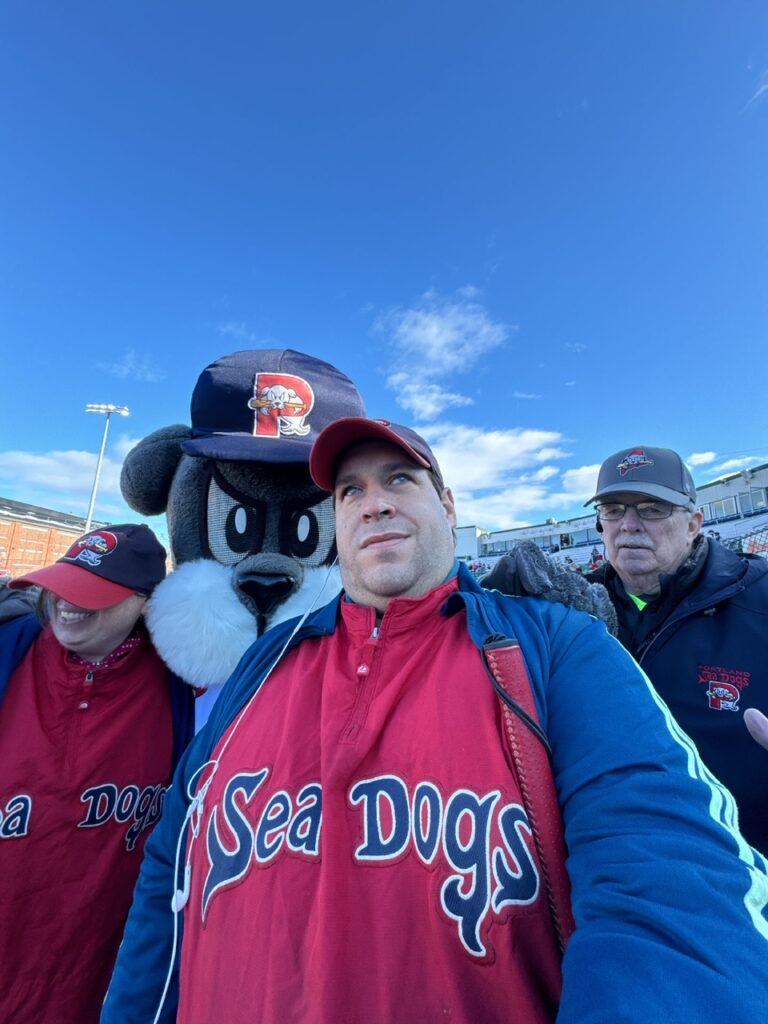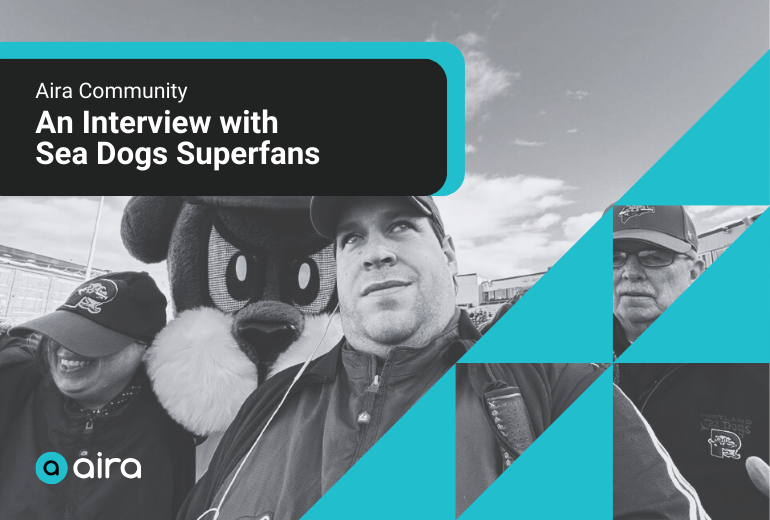Randy and Sarah Bellavance are self-described superfans of the Portland Sea Dogs. The couple, who both serve on Maine’s National Federation of the Blind’s Board of Directors, are season’s pass holders. They are also residents of The Iris Network, a non-profit that serves people who are blind or low vision—and is located just 500 feet from Hadlock Field. Last season, Randy and Sarah lived out a Sea Dog fan’s dream by throwing the ceremonial first pitch at a home game.
For the Bellavances, the thrill of baseball is part of their connection to the Sea Dogs, but their dedication to the team is about so much more. It’s built on hometown pride, the community they are a part of with each game, and the relationships they’ve built with those inside the stadium.
As part of Hadlock Field becoming Aira’s first stadium Access Partner—meaning anyone at Hadlock Field can use Aira for free—we spoke to the Bellavances about accessibility, the baseball community, and what the Sea Dogs mean to them.
What’s special to you about Hadlock Field and the Portland Sea Dogs?
Randy: I’ve been going to these games for 20 years. For me, it’s really the hometown feel. You go to Hadlock Field and everybody knows you from the ushers all the way down to the people running the concessions. It makes you feel like you’re a part of their neighborhood. I grew to love the people and the stadium. And I actually really like watching these players as they develop, and they go up into the majors.
There’s a hometown pride there, not even just for the game itself, but for the people you interact with every day. These are the people who go out of their way to make the experience something special for you.
What does attending Portland Sea Dogs games add to your life?
Sarah: First of all, I love the fact that it’s close by and I can walk to the stadium. It’s going outside into my community, even if it’s just up and down my street. It’s enough to get me out and about in my city and let people know that I’m there. I also like the fact that we actually have women in the radio booth doing the play by play. The Sea Dogs are really special in the fact that they not only had one of the first female broadcasters, but now they have two.
Randy: And it’s also affordable. The Sea Dogs have always provided really good entertainment, fresh air, and community— not for a huge amount of money. You don’t feel like you’re breaking the bank. You can go to essentially 70 games on a season ticket for round about $350. That’s super reasonable. That’s like unlimited entertainment. You don’t have to go there and spend money if you don’t want to. And even if you do, you don’t break the bank doing so.

What are some common accessibility challenges at games that you two have experienced?
Randy: There’s the crowd factor on some of their busiest games such as their Memorial Day weekend games and 4th of July games, even their fan appreciation day and things like that. Those can be really challenging for crowd control or even their bobblehead nights when they do giveaways. People don’t think it still exists but, you know, trying to cut ahead of us in line, things like that. There are people who will actually cut us off because they think we’re not going to be able to tell.
It becomes discouraging. You get pushed, you get cut in front of, and you wind up missing out on a giveaway when you’ve done everything right. So that’s one significant challenge. Another one that I can think of is even doing something as simple as trying to find the restrooms can be a significant challenge.
Now that Aira is going to be free for use at Hadlock, we’re thinking about what we can use it for. Not because we’re out of ideas, but because we have found ways to adapt in the interim. So now we have to basically get used to the fact that, okay, we may have another way to do simple things.
Sarah: I would echo what Randy said, that it is definitely navigation in general. But I would also say the biggest thing I think Aira can help with is to show people that just because I’m visually impaired, it doesn’t mean that I don’t know where I am, that I don’t know where I’m going, or that I shouldn’t be independent. That’s what people assume. You know, even when I go to the store, people assume that because I’m visually impaired, that I automatically must be helpless. I think this will help to showcase our independence.
The Sea Dogs season kicks off in early April. What are you most looking forward to for the 2024 season?
Sarah: I’m excited to see old, familiar faces and hear familiar voices. But this year, I’m also excited to be able to explore being more independent.
Randy: I say this to Sarah all the time, but coming down to Hadlock, it feels to me like coming home. They have always made us feel welcome, no matter what we’ve needed, they’ve always found a way. You know that you always hear people talk about having a happy place? My happy place, my heaven, is Hadlock Field. I love going back to see the people, you know, the ushers, and have really good conversations with them. The game is great and everything, but I’m just going back to looking forward to seeing old friends again. It’s the community and the atmosphere and all the things that kind of go along with the game.
